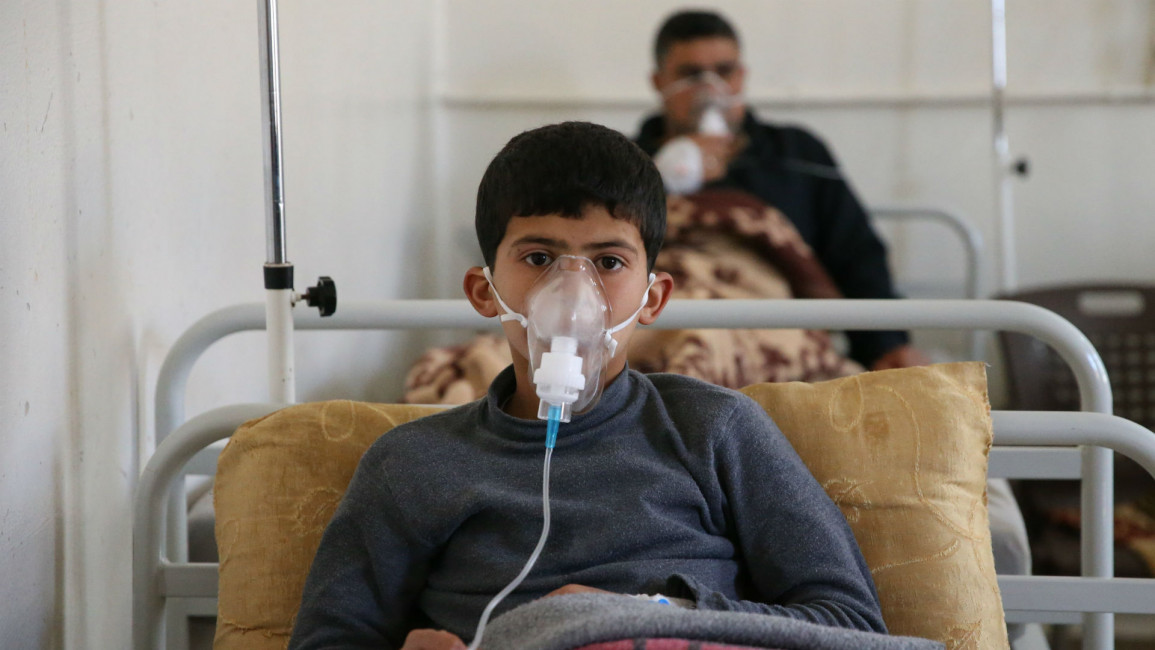Assad regime responsible for '98 percent' of Syria chemical attacks - rebels 'none'
Assad regime responsible for '98 percent' of Syria chemical attacks - rebels 'none'
Syrian rebels carried out no chemical attacks, according to the report.
2 min read
Syria's regime have been almost solely responsible for chemical attacks [Getty]
Almost all the hundreds of chemical attacks in Syria since the start of the 2011 war were carried out by Bashar al-Assad's regime, according to a report released on Sunday by the Global Public Policy Institute.
The report states that at least 336 chemical attacks have taken place in the Syrian civil war, with around 90 percent taking place after former US President Barack Obama pledged his infamous "red line" on August 2013.
Around 98 percent of the gas attacks were carried out by the Assad regime, with the Islamic State group responsible for the remainder.
"The Syrian military's chemical warfare campaign is closely intertwined - logistically, operationally and strategically - with its campaign of conventional warfare," the report read.
"The designs of the Assad regime's improvised chlorine munitions, which have accounted for at least 89 percent of all chemical attacks throughout the war, are clearly derived from conventional 'barrel' or 'lob' bombs."
Thousands are thought to have been killed in the Syrian regime's chemical attacks against opposition areas. Most deadly has been the use of sarin, used in eastern Ghouta in 2013 and the Idlib village of Khan Sheikhoun in 2017.
The aim - as with the regime's use of barrel bombs - appeared aimed at creating terror in civilian areas rather than achieve a military victory.
"It is clear that the Syrian military has consistently prioritised striking population centres over rebel positions on the frontlines, even in the face of defeat on the ground. Indeed, the Syrian regime's persistent and widespread use of chemical weapons is best understood as part of its overall war strategy of collective punishment of populations in opposition-held areas," the report, written by Tobias Schneider and Theresa Lutkefend read.
"Chemical weapons are an integral component of its arsenal of indiscriminate violence, alongside sieges and high-explosive weapons such as 'barrel bombs'."
The first use of chemical weapons is recorded in Khalidiya, Homs in late 2012. Chlorine was used in 89 percent of the attacks, which have centred on opposition areas in Aleppo, Damascus and Idlib.
A failure of the west to halt these attacks have led to an explosion in the number of refugees and deaths in the war, the report concludes.
Syria's war broke out in 2011, when the regime brutally suppressed pro-democracy protests. Since then, around 500,000 have been killed the vast majority civilians in opposition areas while half the population has been displaced.
The report states that at least 336 chemical attacks have taken place in the Syrian civil war, with around 90 percent taking place after former US President Barack Obama pledged his infamous "red line" on August 2013.
Around 98 percent of the gas attacks were carried out by the Assad regime, with the Islamic State group responsible for the remainder.
"The Syrian military's chemical warfare campaign is closely intertwined - logistically, operationally and strategically - with its campaign of conventional warfare," the report read.
"The designs of the Assad regime's improvised chlorine munitions, which have accounted for at least 89 percent of all chemical attacks throughout the war, are clearly derived from conventional 'barrel' or 'lob' bombs."
Thousands are thought to have been killed in the Syrian regime's chemical attacks against opposition areas. Most deadly has been the use of sarin, used in eastern Ghouta in 2013 and the Idlib village of Khan Sheikhoun in 2017.
The aim - as with the regime's use of barrel bombs - appeared aimed at creating terror in civilian areas rather than achieve a military victory.
"It is clear that the Syrian military has consistently prioritised striking population centres over rebel positions on the frontlines, even in the face of defeat on the ground. Indeed, the Syrian regime's persistent and widespread use of chemical weapons is best understood as part of its overall war strategy of collective punishment of populations in opposition-held areas," the report, written by Tobias Schneider and Theresa Lutkefend read.
"Chemical weapons are an integral component of its arsenal of indiscriminate violence, alongside sieges and high-explosive weapons such as 'barrel bombs'."
The first use of chemical weapons is recorded in Khalidiya, Homs in late 2012. Chlorine was used in 89 percent of the attacks, which have centred on opposition areas in Aleppo, Damascus and Idlib.
A failure of the west to halt these attacks have led to an explosion in the number of refugees and deaths in the war, the report concludes.
Syria's war broke out in 2011, when the regime brutally suppressed pro-democracy protests. Since then, around 500,000 have been killed the vast majority civilians in opposition areas while half the population has been displaced.



